Articulate the weaknesses in the current digital product offering and the gaps between what the market offers and what schools want to buy
Important to articulate this intervention
Articulate the weaknesses in the current digital product offering and the gaps between what the market offers and what schools want to buy
Important to articulate this intervention
innovative courseware solutions
to use writing as a tool for learning, communicating, and facilitating their understanding of the complex texts
Annotation is not just note-taking (though it can be). If annotation has always been the beginning of critical analyses in literary study, then in its online, public form, it becomes a more advanced stage of the writing process. For one, annotation online has an audience. While we can think of annotation as the start of the ideas developed in a formal essay, we might also imagine how annotations themselves can be essays!
riting to read strategies
o close ly read complex texts from both fiction and non - fiction sources ,
For which annotation is key.
while communications skills themselves are predicted to be critical to success in all field s in the 21 st century economy (Partnership for 21st Century Skills, 2009) .
Annotation as modeling collaborative writing and review of documents in work places.
Leveraging the capabilities of interactive technology to create an educational experience that isn’t possible in a physical, paper - based world
leveraging social media, making annotation social
Showing students their perfo rmance in order to generate a sense of ownership and agency
Profile pages need to act as portfolios to do this.
And dashboards for group activity could similarly give students a sense of where they're at in relation to classmates.
Behavioral Engagement ,
Might include the motivation to exhaustively (even if collaboratively) annotate a text: to say, "we mastered this!" as a class.
use desktop computers or laptops to access web - based applications.
Thank goodness. Love mobile technology, but for deep engagement in writing especially, nothing beats a keyboard.
ability to deploy in a variety of learning environments due to the diversity of implementation approaches that schools utilize .
Again, LTI is key here. We want to be able to integrate/interoperate with lots of L/CMSs.
Affective Engagement, which includes interest and pride in success.
liking/upvoting?
Cus tomize the learning scope, sequence, and content
need to partner with a content provider:
1) publisher/distributor of text exemplars
2) publisher/distributor of lesson plans inclusive of
continuing to personalize instruction
adding tags to personalize learning for students/advance certain students to next level of comprehension/analysis
performance data
G enerat ing student performance data that can help students, teachers, and parents identify areas for further teaching or practice
Data, data, data
Providing digital content aligned to teacher - delivered content to r einforce or help students to apply new concepts
ability to create a set of prefabricated tags for a group, so students can label annotations with concepts, etc. that they are applying (or standards that they are fulfilling).
differentiated view for instructor?
described a vision for technology - supported learning that consists of rich, dynamic learning experiences both onli ne and off, and technology that enables teachers to engage deeply with their students one - on - one or in small groups.
from teachers...
(Education Market Research, 2012) .
See/cite
curriculum software packages
courseware?
courseware 7 | P a g e (instructional software)
courseware defined as "instructional software"
Increasing the amount of writing
annotation naturally does this
give them the capacity to design and deliver personalized instruction to their students .
real - time feedback
instructional arrangement s where children work together to plan, draft, revise, and edit their compositions
collaboration and peer engagement
The iterative, multi - step, and reflective practice of writing is well suited to digital supports and tools, which generate digital artifacts that can be exchanged and also analyzed to reveal a student’s thinking and skil l development (National Research Council , 2001)
See this study.
Writing helps students at all grade levels (a) better express thoughts, arguments, and ideas, (b) deepen content knowledge, and (c) demonstrate proficiency (Graham & Perrin, 2007) .
Annotation=writing as comprehension/analysis
However, tools to support students in developing reading and writing skills are lagging far behind,
ELA tech tools as "what's missing"
help teachers , parents and learners diagnose gaps in students’ knowledge and skill and adapt th e learning experienced based on their progress.
importance of capturing some kind of data
deep, one - on - one engagement with their teacher and other students tha t is often missing from today’s classrooms.
SOCIAL annotation
Have low technical requirements – i.e. use standard classroom hardware and are interopera ble with other software solutions
Does this mean LTI?
2. I nstructional content discoverability
Note
formative assessment data
Reinforcement of practice
Does this mean feedback?
persuasive writing using textual evidence
Writing from evidence is annotation!
to use writing to support learning in all subjects , including science and social studies ;
Annotation as writing: key not only to ELA, but sciences as well.
through 8 th - grade
Why stop here? Can we expect a similar CFP for grades 9-12?
As a baseline, applicants are encouraged to use content formats that have been adopted by the World Wide Web Consortium (W3C)
Way to go, Gates!
web - based
Huh. Cool parameter!
Teachers Know Best is a multi-year research effort to better understand how teachers use digital instructional tools and how these tools can be improved to foster personalized learning.
Important potential partner/collaborator. Here's their site.
learning experiences that are tailored specifically to their progress
Or at least self-directed application of those standards and skills--that is, across the Internet!
and experiencing the deep, one-on-one engagement with their teacher
public and private feedback mechanisms--replies are public (teachers should be "featured") and we need private.
accelerating beyond the fixed pace of today’s classroom.
Or, extending the energy of face to face class time into the remote world of online exchange.
when Ashton Kutcher joined, that the service took a permanent turn toward Hollywood.
He really is the Steve Jobs of Hollywood!

In promotion of the Steve Jobs movie, Kutcher actually annotated some of the Apple founder's most famous speeches on Genius.
It could be a conversation. It wasn’t about reporting; it was about connecting.
And maybe it's not just about reporting and connecting, but reporting and connecting through something specific, some artifact of the online world: annotation.
There's already a segment of the Twitterati doing this via highlighted screenshots of text attached to Tweets as photos ("screenshorts" they are called).

There's even an app to do this now: OneShot.
and, of course, Justin Bieber.
And then we got to share in the pathos of his 18th birthday (best read in reverse):
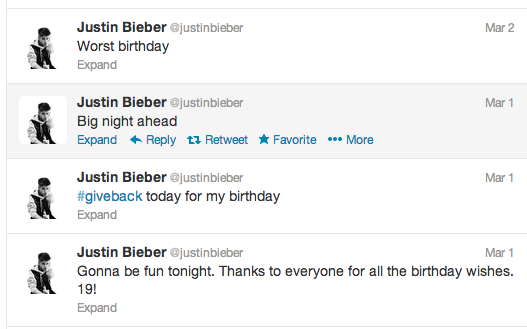
Celebrities joined the service,
Rule number one of Silicon Valley: get (pay? bribe?) famous people to use it.
Such is the case with every company in Silicon Valley, though you never hear it in their creation myth.
Because those creation myths are aligned with the cult of the individual in American culture. We tend to value individual accomplishment over collaboration.
a status updater that could be used to connect friends
hypothes.is = an article commenting tool (?) that could be used to connect with friends
like “going to park,” “in bed” and so forth.
Status update: "'Annotating' longform article on Twitter's founding."
Illustration by Paul Sahre
Really love the illustrations for this article. But shouldn't the knife be in the bird's back?
share their current locations with a note attached.
share their current readings with a note attached; geo-location v location within an intellectual/textual world
a steady stream of conversation percolating online.
While Twitter has certainly become just this, it strikes me at how bad Twitter actually is at "conversation." It's actually quite difficult to sustain a focused back and forth on Twitter. IMO.
vodka and Red Bull,

often winning the company’s weekly “Getting [expletive] Done” award,
Ah, #startuplife.
In the Valley, these tales are called “the Creation Myth”
Says something about our religious reverence for technology in America too.
Usually it’s not simply because the ideas are bad (although some certainly are),
Like this one:
Google acts as the service provider and provides services such as Gmail and Start Pages. Google partners act as identity providers and control usernames, passwords and other information used to identify, authenticate and authorize users for web applications that Google hosts.
What about the reverse? Is Google ever "identity provider" for a third party?
new materials to be developed collaboratively with teachers
how do we do this?
95% of students between 12 - to 17 - year - old go online regularly,
Need source for that.
Web annotation engages students where they already are: on the Internet. And gives them a powerful tool for being thoughtful, engaged citizens therein.
EdNovo
Check these guys out, rebranded.
Literacy Design Collaborative (LDC
REALLY need to connect here.
University of Washington ( $610,819 ) The purpose of this award is to develop tools and resources to support school and district leaders in th e implementation of the Common Core State Standards.
Curious to see more about what they are up to, but can't find any web presence for the project.
Educause
Need to connect here: annual conference is in October.
g rant awards are a dminis tered by HASTAC - an alliance of individuals and institutions interested in new technologies.
Interesting...
projects that examine what young people are doing online, how they view online activities, and what types of competencies, skills, and knowledge they are gaining.
What would young people need to start using hypothes.is regularly as they use Genius?
D igital Media and L earning .
BINGO!
adequate and f airly distributed resources ,
Like OERs?
pen educational resources ;
civic engagement
We need to leverage this potential for web annotation in our education applications. This is at its broadest about becoming more aware and engaged web-citizens.
to cellular phone.
"cellular phone"? oh, they mean "celly."
use of massively online open courses (MOOCs) as a part of the post - secondary education process.
interesting that MOOCs here conceived as part of undergraduate ed rather than as continuing ed...
If there’s one word to explain how technology can transform edu cation, it’s personalization.
What is "personalization"? Choose your own adventure style? Or self-directed: choosing content that interests you?...
The Foundation is now investing i n develop ment of next - generation instructional tools for teachers and students that will help states and school districts implement the new standards .
BINGO!
self - paced learning
self-paced and self-directed, around content chosen by students themselves...
“Higher , ” focuses on the ability of learners to both apply their new - found knowledge and to transfer the knowle dge to different situations.
Trackable and assessable annotation of the web seems perfect for this "higher," application ideal.
quick, accurate measurements of progress .
hmmmm...
social network abilities already developed in 95% of 12 - to 17 - year olds
What are these? Posting comments? Sharing? Writing for public audiences?
game – based learning
Do notifications and leaderboard-like features go enough in this direction?
hrough innovation...” with special emphasis placed on building and sharing tools, strategies, and standards
Gates emphasis on tech
teacher feedback systems that allow for both measurement of effectiveness, coupled with development of feedback avenues to support professional development.
can student feedback systems loop into teacher feedback ones? in other words, doesn'T measuring student progress eventually double as evaluation of teachers.
how important measurement is to improving the human condition.”
i.e. data
cannot be viewed as individual steps but rathe r as a continuous progression
need a scaffolable product that can be used in one way at an early stage and becomes more sophisticated as students develop
relatively low fund ing occurring in actual implementation
We're really all about the implementation...
Digital media, technology, and out - of - classroom learning opportunities
what does out-of-classroom mean exactly? digital learning tools? or tools so compelling that a student might use them outside of class on their own initiative?
nnov ation
i.e. technology
in-class, whole group annotation and discussion
Why not use a web-based application that allows for this kind of collaboration!?
GNU license
General Public License, free software license.
Programs that introduce faculty and graduate students to effective pedagogies,
humanistic engagement with the digital
Capacious and innovative curricula
Integrate traditional schooling with after-school, out-of-school, and anytime/anywhere learning opportunities
Apply Common Core skills like close reading to other content: mainstream media, politics/legislation, etc.
This is kind of obvious with Rap Genius: students were using traditional humanities skills to analyze lyrics.
expanded learning schedules
Another common theme across foundations. Wallace is interested in this too.
“the process through which a person becomes capable of taking what was learned in one situation and applying it to new situations; in other words, learning for ‘transfer . ’”
What better way to do this than taking a skill- or content-based lesson and applying it to the web as a practice through annotation.
effective democratic participation
Emphasize annotation as key to civic literary and participation.
collaboration
Collabora-tive annotation?
the Common Core standards are strongly aligned with deeper learning—and represent an especially promising leverage point for the Program to help advance its goals . 9
"Deeper learning"=Common Core
Red Smith
The one name here I hadn't heard of before: a Pulitzer-prize winning sportswriter.
North Carolina is one of thirty states that have permissive “open carry” laws, which means that you do not need a license to walk around with a gun in plain sight. The law makes an exception when firearms are displayed to terrorize people, but in Hicks’s case nobody tested that prohibition.
Isn't the very meaning of a fun, terror?
test
2+2=4 ∑i=0∞πi=∑i=0∞ρiπ0=π01−ρ=1
test
2+2=4 ∑i=0∞πi=∑i=0∞ρiπ0=π01−ρ=1
test
NESCO/COL a nd UNESCO Chairs in OE
Whoa, these guys are involved!?
equal access
I'm thinking through what "equal engagement" might be. Access is s starting point. What about the tools to do something with the access granted?
Mike D., from Brooklyn
I really hope that this is who I think it is.
Yet for those that still yearn for the safe tether of a synthetic text,
Doesn't this project also radically depart from the traditional textbook format and industry in less than "safe," but equally exciting ways?
But in the oft-cited lines of the American poet Walt Whitman we find as good an organizing principle as any other:
I really love this idea as the "yawp" as an organizing principle for a collaborative, open textbook. Given his own obsessively iterative composition of Leaves of Grass Whitman really is a great analogy for this project.
John Muir, a naturalist, writer, and founder of the Sierra Club, invoked the “God of the Mountains” in his defense of the valley in its supposedly pristine condition.
The "Gods of the mountains" line was a piece of Muir's larger metaphor for the holiness of natural places that figured those who would develop them as "temple destroyers." Here's the full quote from Muir's defense of the Hetch Hetchy in his book The Yosemite.:
These temple destroyers, devotees of ravaging commercialism, seem to have a perfect contempt for Nature, and, instead of lifting their eyes to the God of the mountains, lift them to the Almighty Dollar.
Dam Hetch Hetchy! As well dam for water-tanks the people's cathedrals and churches, for no holier temple has ever been consecrated by the heart of man.
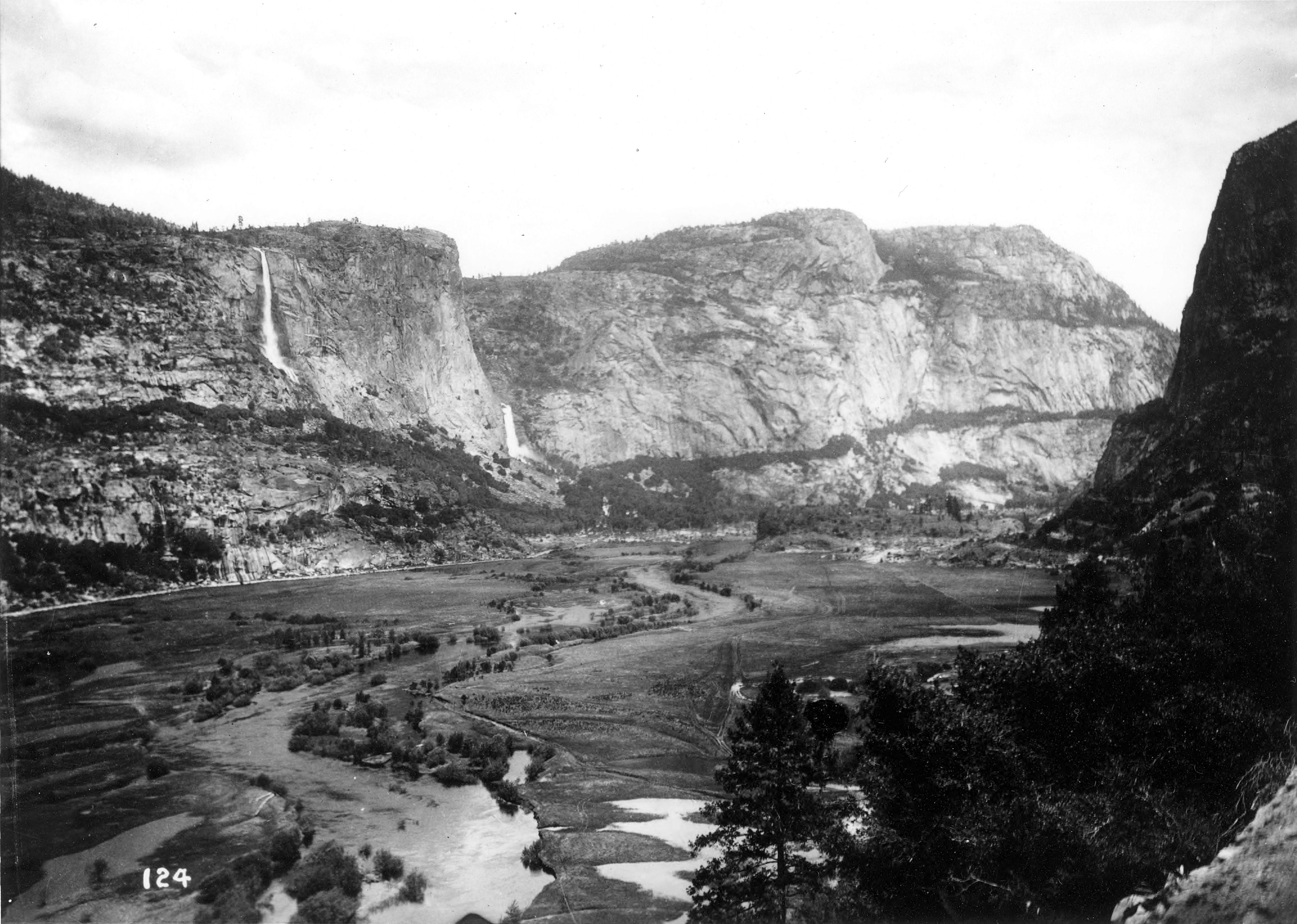
giving readers an unflinching view of urban poverty.

Recent scholars have critiqued Riis's work despite its effective advocacy for tenement reform. His photography certainly exposed the problem of urban poverty, but also exposed the personal lives of the poor to a largely wealthy audience.
Altamont revealed a darker side of American culture, one in which drugs and music were associated not with peace and love but with violence, anger, and death.
How does this mess, though, relate directly to the "unraveling" of American promise signified by the late 60s. Was Hunter killed because he was black? Or because he was high? Or because the Angels were drunk?
portfolios,
Ding-ding-ding! hypothes.is needs to build out profile page as portfolio-like...
The new Common Core State Standards are an enormous step forward toward the goal of preparing all students for the future: across forty-five states, schools are now required to teach skills like critical thinking and effective communication alongside core academic content.
So Hewlett is also investing in CC...
The tools are designed to be simple, flexible, and allow teachers to maintain creative license in how and what they teach.
Web annotation technology is about as "flexible" as one can get with a tool. It can be used independently by students, by teachers and students, and integrated into LMS and CMS systems.
helping teachers bring the Common Core to life.
Two ways I see this happening with annotation:
1) Making the text social. It's like Facebook!
2) Making it multimedia. Allowing students to annotate with images and video add dimension to the text.
3) Visualizing the annotation process through text selection and commentary really drives home the idea of close reading.
Teachers who are using these tools
Dead link?
Consistent standards allow teachers to create a community where they can connect with each other, learn from each other, share with each other, and improve their practice with each other.
Should there be a teacher layer to curriculum that allows teachers to collaborate with each other in designing curriculum?!
college and career
Need to address the "career" aspect of the Common Core at some point": digital literacy is about the web, the world, not just school...
developed by teachers
Said this before, but need to partner with actual teachers in alignment of standards/creation of curriculum.
COLLEGE-READY EDUCATION PARTNERS
Potential partners in Gates grant?
inBloom
Probably should remove this one.
part of the fabric of schools around the country
what about becoming part of the fabric of daily student life online, both in the classroom AND OUT!
we’re working with teachers to design materials
how can we do this? how do we partner with teachers to develop curriculum that uses hypothes.is for common core?
customized pathways to achievement,
Annotating the open web is a natural way to allow students to "customize" their learning. They choose the content they read and engage with, and directed by teacher guidelines, engage with that content to demonstrate learning.
Blending
Keyword
Blending
Keyword
Ninety-five percent of 12- to 17-year-olds already go online on a regular basis. They use social networks, and create and contribute to websites. Our work is focused on taking full advantage of the kinds of tools and technologies that have transformed every other aspect of life to power up and accelerate students’ learning. We need to do things differently, not just better.
hypothes.is/collaborative annotation meets students where they are: online, giving them a tool to interact more critically with the texts and ideas they encounter on the web
to strengthen the connection between teacher and student.
Social reading brings students and teachers, and students and students, together.
new generation of courseware
BOOM!
in and out of school, in person and online, together and independently.
Asynchronous learning...collaboration...
individual needs,
Self-directed/student-centered learning...
a globally connected, information saturated world.
I.e. the Internet!
game-based learning that generates rich data about students’ progress
need feedback system at the very least: likes/upvotes, email notifications...also possibly a dashboard, for students and teachers, that shows recent work, top annotator, etc. (by volume, by like)...DO WE NEED GAMIFICATION?
When learning is personalized,
How much more "personalized" could you get than annotating the open web?! Let students read and discuss what they want, but evaluate them according to the standards/expectations.
In personalized learning, the student is the leader, and the teacher is the activator and the advisor.
We this transformation of student from passive recipient of knowledge to active producer through annotation as well.
increase low-income students’ college completion rates
Nearly three out of four postsecondary students today are not enrolled in a full-time, four-year degree program. They are balancing jobs, family, and other priorities as they work to finish their studies.
Importance of asynchronous learning opportunities.
Providing platform for engagement with course content but also feedback to student work (whether peer or instructor).
test the use of interactive online learning platforms in 17 courses across seven universities.
Dead link. :(
See here?
By calling attention to itself as a textual presence (rather than a vehicle of linguistic reference), the typography turns the lines back into themselves, leading one to identify the “black riders” with their immediate typographical unfolding.
Just because they are bolded?
and student engagement
As far as that goes, using an open web annotation application like hypothes.is seems like a great match for OER textbooks.
, an OpenStax College resource. This textbook has been created with several goals in mind: accessibility, customization,
Of course, the concept of the "frontier" remained an important idea in American history, motivating other forms of expansion and empire.
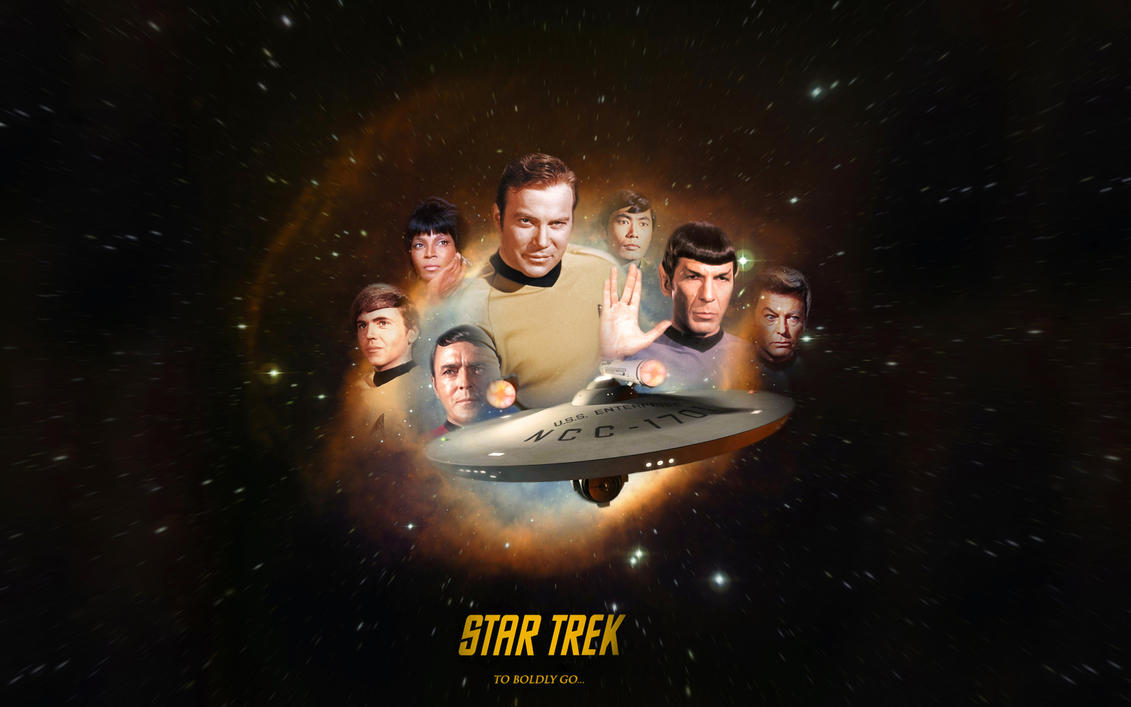
semico m- mons — a resource that is owned and managed as private pro p- erty at one l evel but as a commons at a n other, and in which “both common and private uses are important and impact si g- nificantly on each other.” 42
Yes, this acknowledgement of the largely private space of the online world is far too often overlooked in utopian views of the Internet as a "commons."
shared infrastru c ture with limited capacity
Does it?
well - moderated community will have low costs
If the moderators are unpaid community members?
moderation can increase access to online commun i- ties.
But doesn't deleting someone's stuff make it less open (at least to them)?
participation in moderation and in setting moderation
So transparency is critical.
the unlucky YouTube employees who manual ly r e- view flagged videos. 24
This isn't automated?
r when a comm u- nity is tor n between participants with incompatible goals (e.g. , amateur and professional photogr a phers).
Are expert and amateur always incompatible in this way? I'm thinking here of how to at once allow for anyone to have a conversation on a page using annotation, but also to surface for discovery expert voices...
Similarly, partic i- pants on a discu s sion forum may shoulder some of the work of 24 See Brad Stone
So this is obviously annoying in annotating PDFs: I want the target to continue on to next page and ignore the footnotes. Can't imagine a technical solution. Maybe just campaign for "Endnotes only!"
moderation by flagg ing unwanted posts for deletion because they enjoy being part of a thriving communit
Motivating users to take ownership seems key. A simple flag feature could make an active user all the more involved.
Thus, even though it is not pa r- ticularly helpful to talk about Google as a c ommunity in its own rig ht, 21 it and other search engines play an important role in the overall mo d eration of the Web . 22
Indeed, Google search organizes communities from their inception: which entry points are immediately discoverable and which are not.
ex ante versus ex pos
Before or after the event. In terms of online community moderation, this likely refers to systems that prevent or punish bad behavior.
norms versus architectu
From "pathetic dot" theory, popularized Larry Lessig's Code and Other Laws of Cyberspace.
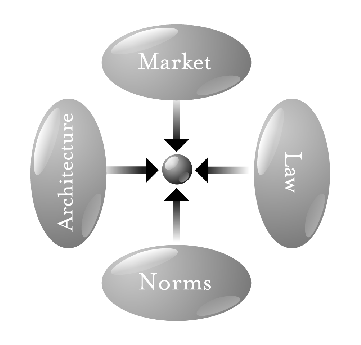
"Architecture" refers to the technical infrastructures that regulate individual behavior. In this case, I suppose that would be the design of online communities?
http://www.wired.com/2014/10/content - moderation
This is a fascinating read on the largely outsourced physical labor needed to police social media.
d. When they do their job right, they cr e- ate the conditions under which cooperation is possib
This is an obvious point, but one that I think is not necessarily emphasized in discussion of the problem of moderation: it's not just about deleting bad content, it's about enabling good content creation.
t,” it r e mains almost entirely g oatse - free.
Though, of course, you can learn lots about the history of the Internet meme there.
Aaron Swartz
Quoting Schwartz in epigraph really sets the tone of this article.
: vandals overran it with crude pr o- fanity and graphic pornography
I know this is not the point, but the topic itself has its own illicit history.

I wonder if controversial topics are more prone to trolling than others.
A BSTRACT TL;DR
Never thought about it before, but "Abstract" really does translate to TL:DR in Internetspeak.
But the project ran into roadblocks in a number of districts and states over privacy and security issues.
Note to self: take student privacy seriously.
Freedom
test 2
Social Production
test
called on designers and social scientists to ethically embrace their role as the web's “civil servants,”
Got to read this article itself, but civil servants are civil servants because they are employed by the government, not because they think of themselves that way. I love the idea, but I guess I'm worried that without something more official in place, this ethos cannot be institutionalized or even broadly applied.
dependent on those who use them and on the subjective judgments of the people who provide mutual aid.
As in "real-life," what do we do about the George Zimmermans of the world, rogue "moderators" claiming a kind of "mutual aid" in their neighborhood watch, but deeply problematic in their views and actions.
This digital citizenship acknowledges that online experiences are as much a part of our common life as our schools, sidewalks, and rivers—requiring as much stewardship, vigilance, and improvement as anything else we share.
I really like the argument of this article. But I have some issues with the analogy between the online world and what are mostly public physical spaces.
Unlike, rives and sidewalks, online space has little to no regulation, whether from the government or NGOs.
Also, most of our public interactions online take place in private spaces, that is, places owned and operated by private corporations.
operation of online platforms?
Or the Net itself...
So companies like Facebook and Twitter rely on an army of workers employed to soak up the worst of humanity in order to protect the rest of us. And there are legions of them—a vast, invisible pool of human labor.
Truly had assumed that this work was done automatically.
They won’t continue to log on if they find their family photos sandwiched between a gruesome Russian highway accident and a hardcore porn video.
Conjecture!
"computer room"—yes, people really used to call it that—
LOL, it's true. I remember those days chained to our wires.
with the answers they wanted
Well, answers anyway.
You touch a button on your phone and something happens in the world.
This is profound, but it's also obvious. Obvious as in it makes this basic aspect of technology readily apparent to the end user.
Actually, when we press most buttons, lots of things happen in the world. One click on Amazon begins a complex process of labor and energy consumption, but this is conveniently hidden from the end user.
happily pay more than 20 cents per month for a Facebook or a Google that did not track me,
How much would it actually cost though to buy into Facebook if we take away its monetization power? My guess is that it would be a lot more then 20 cents, though I might still be willing to pay.
He knows privacy is worth paying for. So he should let us pay a few dollars to protect ours.
Zing!
Yeah, Zuck is notoriously protective of his persona life. This irony has to be one of the greatest of the Internet Age.
Yet ad-based financing means that the companies have an interest in manipulating our attention on behalf of advertisers, instead of letting us connect as we wish. Many users think their feed shows everything that their friends post.
This is the crucial point for me: we are not really "connecting" through Facebook if the connection is not on our own terms, so the very concept that underlies the service is problematic.
The same can be said of Google: our search for information is not authentic if the search results are taking into consideration ad-partners, etc.
I'm personally much more concerned about this paradox in the latter case as it pertains to knowledge production.
a proprietary, ever-changing algorithm that decides what we see.
Are all algorithm's evil, though? Is there such a thing as a benevolent algorithm?
Isn't the real problem that FB mixes in things it thinks I would like to buy alongside the things I "like"?
FACEBOOK. Instagram. Google. Twitter.
Don't want to take away from a VERY important opinion article here, but what exactly does the NYTimes style guide say here? Why are Facebook and Google--of all sites!--linked but not Twitter?
The World Says No to Surveillance
I think it's interesting that this op-ed came out on the same day as another one "saying no" to a different, but related kind of surveillance: Facebook's monitoring of user activity for commercial purposes.
Here's a leaked Prism slide explaining their interest in how "typical users" behave on the Internet:

we did not just laze in an armchair turning pages;
Don't just sit there, HASTAC Scholars, annotate something!
to interact and collaborate with others.
This emphasis on collaboration is particularly important in social reading. Through replies, each annotation is actually the beginning of a potential conversation.
Write routinely over extended time frames (time for research, reflection, and revision) and shorter time frames (a single sitting or a day or two) for a range of tasks, purposes, and audiences.
Digital annotation is particularly suited to this type of everyday writing practice.
In a sense, it's more like posting to Facebook or Twitter than writing an essay. But because it is grounded in text, it encourages more thoughtfulness.
At the same time, if students are regularly annotating using an application like hypothes.is, then they will surely exceed the word count usually required in a five page essay. Annotation projects might be seen as pre-writing--a collaborative drafting space for ideas and language to be developed later in formal papers--or it might be seen as an end in itself.
through the effective selection, organization, and analysis of content.
This is essential to the pedagogy of annotation as well. The first step must be to identify an appropriate selection of text from a document. The annotation itself is the space for analysis.
Gather relevant information from multiple print and digital sources,
Students using an annotation application like hypothes.is can literally map their research on a topic in tagged annotations on sources from across the Internet.
The focus on "decoding" should send shivers down the spine of every English teacher who has ever had a student demand they just tell them what the poem means.
I think Billy Collins captures this tortuous pedagogy well in "Intro to Poetry":
But all they want to do is tie the poem to a chair with rope<br> and torture a confession out of it.
They begin beating it with a hose<br> to find out what it really means.
he greatest thing a human soul ever does in this world is to see something and tell what it saw in a plain way.
Annotation would seem to have a role to play here.
An underlined
This style of highlighting requires a number 2 pencil to be whittled down at a slant to allow for a 2 mm thick line to be drawn under text. It needs to be straight. It needs to hug the lettering just so.
Among other texts, my students and I added selections from The Great Gatsby to the platform and some of those excerpts are among the most highly trafficked pages on what has now become Lit Genius,
And many of my students remain top scholars on the text:

procrastinating on Rap Genius
Mostly annotating Black Starr. I still love that Genius calls their users "scholars." Great branding! I'm also #2 scholar of F. Scott Fitzgerald and #3 scholar of St. Paul.

When Rap Genius received their Series A round of fundraising–$15 million from Andreessen Horowitz–
Here's how Andreessen himself explained the investment, annotated on (Rap) Genius. After this investment, Genius pivoted slowly from annotating lyrics to, like hypothes.is, annotating the web.
I first discovered the power of collaborative annotation
Collins actually imagines a moment of shared marginalia in his poem. In a copy of A Catcher in the Rye that he borrows from a library as a boy, he finds the following: “Pardon the egg salad stains, but I’m in love.” The young Collins imagines the note to be written by a beautiful girl and feels himself in a sense falling in love with that other reader. Though we need not develop a dating service out of the modern technologies that allow for social reading, we can at least see the humanity that can be shared in the margin of a digital page: the teachable moments, the conversations that might occur. We have glimpsed such moments on other social media like Twitter and Facebook, but I argue they lack the depth of annotation, which brings together text, comment, and now, readers.
it slows the reader down,
It's interesting to think about this idea of "slow reading" in relation to collaborative online annotation. So many traditional humanists complain of the cursory of the digital--hashtags on Twitter replacing sentences, Wikipedia summaries are replacing "actual" research. But web annotation requires readers to pause and consider in the very ways we have always taught our students to do in English classes.
like teaching composition using Second Life
Very cool project, just beyond me. (Play it here!)
undetermined momentousness
Such an ambivalent phrase. The narrator seems to be claiming that this is a "moment" unparalleled in its significance. Yet this significance is "undetermined"; it remains unclear exactly how the moment is significant.
di un dialogo impercettibile tra pergamena e pergamena, una cosa viva, un ricettacolo di potenze non dominabili da una mente umana, te
HathiTest
Analyze how two or more texts address similar themes or topics in order to build knowledge or to compare the approaches the authors take.
Again, the hypothes.is application allows for this kind of intertextual analysis to be activated and visualized in powerful ways. Students can literally link between related themes or moments in various texts studied.
words and phrases
Digital annotation powerfully visualizes this process, as the application allows the user to isolate a particular word or phrase, and then create a comment specifically on that piece of textual evidence.
PRINT THIS PAGE
No, annotate this page!
including visually and quantitatively, as well as in words.
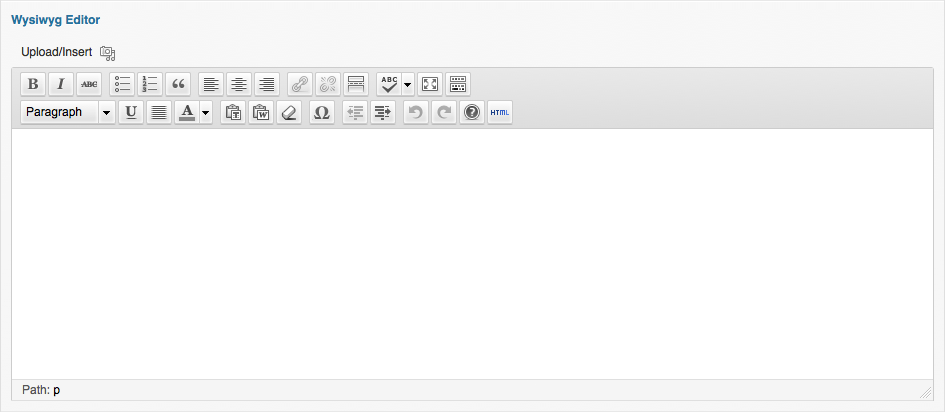
The possibilities of digital writing, given the WYSIWYG interface above, allow for students to integrate a variety of media into their own annotation compositions. Moreover, this use of media is not simply illustrative but as an integral part of the overall argument.

Read closely

Close reading is a major emphasis of the Common Core Standards, though most English teachers since New Critic I.A. Richards would probably agree that is it essential to any humanities curriculum. As the "Introduction" to the ELA section states:
Students who meet the Standards readily undertake the close, attentive reading that is at the heart of understanding and enjoying great works of literature.
Digital annotation, though, is close reading 2.0. The major activity of a service like hypothes.is is "annotation," the highlighting and noting of words, phrases, and sentences, which demands that students keep their thinking and writing "close" to the text and its evidence.
Moreover, because digital annotation has the potential to be collaborative. It links this mandate for close reading with later calls in the Standards for collaboration. I like to think of hypothes.is as a "A Social Network for Close Reading." Could we make students obsess with annotations on the web like they obsess with Facebook and Twitter posts?...
technology is the American theology
nice phrase